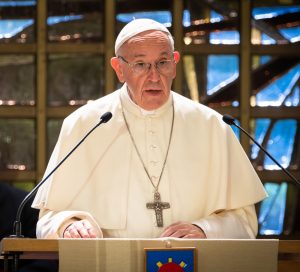
By Cian Molloy - 08 June, 2019

Pope Francis (Photo: Magnus Aronson/WCC)
Pope Francis is making changes to the way we say the Our Father, the prayer that Jesus taught us.
Under changes approved by the Pontiff this week, we will soon stop saying “lead us not into temptation” and, instead, we shall say “do not let us fall into temptation”.
There has been some disquiet about the current English-language version of the prayer for some time, with the wording under official review for more than 12 years, since the time of Pope Benedict XVI’s papacy.
Pope Francis criticised the English version’s wording in an Italian television interview in 2017, when he said: “It is not a good translation because it speaks of a God who induces temptation. I am the one who falls. It’s not Him pushing me into temptation to then see how I have fallen.
“A father doesn’t do that. A father helps you to get up immediately. It’s Satan who leads us into temptation, that’s his department.”
Presumably if the English version of the prayer is to be amended, so too will the Gaeilge version, with “ná lig sinn i gcathú” being changed to “ná lig sinn titim i gcathú”, which would be an acceptable formulation to most native speakers.
While the vernacular Mass, introduced in Ireland in 1965 following the Second Vatican Council, is a relatively modern invention, there have been versions of the Our Father and the Ár nAthair in existence for more than one thousand years. The oldest English translation dates back to AD 650.
The new wording was approved by the general assembly of the Episcopal Conference of Italy last month. It will appear in the third edition of the Roman Missal, which contains the guiding texts for celebrating Mass.
It will be interesting to see what impact the change will have on Church unity in the English-speaking world as it means Roman Catholics will say one version of the Lord’s Prayer and Anglicans and Protestants will say another. Within the Catholic Church, the change will serve to bring the faithful into line with what is already practice in the French- and Spanish-speaking Church.
One reason why Pope Francis may be especially keen on changing the English and Irish versions of the prayer is that the current forms do not match his personal Church experience. In Argentina, when Catholics say the Lord’s Prayer in Spanish they say “nos dejes caer en la tentación”, which means “do not let us fall into temptation” or “ná lig sinn titim i gcathú”.